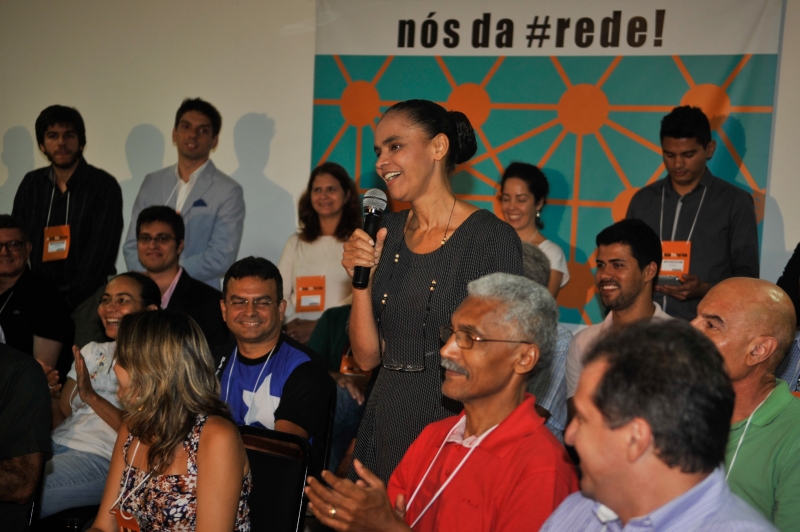A former Brazilian presidential candidate and famous environmentalist is leading the charge for the creation of a new political party in the country, one that seeks to use the Internet as a tool for action on sustainability issues.
Former Brazilian Environment Minister Marina Silva officially launched her Sustainability Network in the capital Brasilia on 16 February, 2013, to a crowd of around 1,700 people, including supporters, founders and ideologues. The network aims to collect the required 500,000 signatures by September 2013 to become legally recognised as a political party.
The network was born from a movement created on social networking sites in the wake of Silva's 2010 presidential campaign. In the elections that followed [pt], Silva received a total of nearly 20 million votes with the Green Party (PV), which secured her third place and caused the elections to go to a second round, a fact which came as a surprise to the Workers’ Party (PT), having firmly believed that the dispute would be resolved in the first round with Dilma Roussef's victory.
Silva's candidacy for the Presidency of the Republic in the 2014 elections depends on the new party becoming operational by October 2013, which, in turn, not only depends on collecting the signatures, but also on publishing the constitution in the Official Federal Gazette (which occurred on 26 February, 2013) and court approval [pt – all links].

Brasilia – Former Senator Marina Silva speaks at the launch of her new party. Photo from José Cruz/Agencia Brasil (CC BY 3.0)
The Sustainability Network's political manifesto [pdf, pt], released at its launch, stands at just over five pages and was drafted by party founders and ideologues, including Heloísa Helena, João Paulo Capobianco [pt] and Walter Feldman [pt].
Acreditamos que as redes, como forma de agregação e organização, são uma invenção do presente que faz a ponte para um futuro melhor. (…) Pois é em rede com a sociedade que queremos construir uma nova força política, com alianças alicerçadas por uma Ética da Urgência, tendo como horizonte a construção de um novo modelo de desenvolvimento: sustentável, inclusivo, igualitário e diverso.

Screenshot of the website BrasilEmRede.com.br [pt]
[A Rede Sustentabilidade] Irá “pescar” aqui e ali afiliados nas outras legendas. Certamente os insatisfeitos. Ou seja mais uma legenda para reunir os oportunistas e deserdados pelos seus ex-correligionários. Vai ser a cara de tantos outros já existentes.
[Sustainability Network] is going to “hunt” here and there for members from other parties. Certainly the unsatisfied ones. That is, yet another party bringing together the opportunists and those excluded by their former colleagues. It will be the same as so many others.
After Silva appeared on the television programme Roda Viva [pt] on 18 February, 2013, to clarify many points relating to the movement, including the matter of being “neither for, nor against [the political status quo]”, online criticism began to soften.
Another commenter, Roberto de Santana Conceição [pt], wrote that he was impressed with the interview:
[…] Marina parabéns pela entrevista, já estava decepcionado de ser Brasileiro, de ser gente, acredite, sei do poder das palavras tão usadas pelos grandes líderes políticos e religiosos, mas senti que poso [sic] voltar a votar, espero não me decepcionar.
Mas não se esqueça, vivemos num Pais que a corrupção viro [sic] tradição e a batalha será árdua.
[…] Marina, congratulations on the interview, I've been disillusioned about being Brazilian, being human, believe it, I know the power of the words used by the great political and religious leaders, but I feel like I can go back to voting, I hope I won't be disappointed.
But don't forget, we live in a country where corruption has become a tradition and the battle will be hard.
Taking issue with the formation of Silva's party, Amaro Doce made the following observation in his post reproduced on the blog Luis Nassif Online [pt]:
Nada decepciona mais nesse partido da Marina Silva do que a negação da luta política dos mais fracos e da pregação ao conformismo submisso aos mais fortes.
Nothing is more disappointing in Marina Silva's party than denying the political struggle of the weakest and preaching submissive conformism to the strongest.
He then mentioned the declared support for the Sustainability Network from Maria Alice Setúbal, heiress and shareholder of the bank Itaú Unibanco, and Guilherme Leal, Silva's 2010 vice-presidential candidate and owner and president of cosmetics company Natura:
É a “utopia sonhática” do Itaú, da Globo, do bilionário neoliberal dono da Natura. É a sustentabilidade reacionária e conservadora. Os bilionários mandam, eles são os “sábios” conselheiros, orientadores e ideólogos de um hipotético governo, cuja REDE Marina se encarregaria de manter conectados os brasileiros, obedientes à ordem dominadora moldada por eles. Todos conformados, igual aos dominados no filme Matrix. Semelhante aos primeiros 502 anos da história do Brasil.
It is the “visionistic utopia” of Itaú, Globo, and the neo-liberal billionaire owner of Natura. It is reactionary, conservative sustainability. The billionaires control, they are the “wise” advisers, mentors and ideologues of a hypothetical government, where Rede [Sustainability Network] headed by Marina would stay connected with Brazilians, obedient to the dominating order shaped by them. All conforming, just like those dominated in the Matrix film. Similar to the first 502 years of Brazilian history.
Following the same rationale, that of denying political struggle and socialist ideals, Sonia Maria de Gouveia commented on Revista Sustentabilidade [pt]:
O escritor Homero temia as imperfeições da palavra escrita, devemos, então, ter em mente o quão problemáticos são os textos escritos quando analisamos as ideias da ex-senadora e evangélica, de um lado ela tem um forte pé da nas ideais socialistas e favor dos pobres, de outro precisa cativar os jovens e pessoas sem ideologia comuns em nossa época, logo repudia sua formação socialista [em] prol do projeto pessoal de poder. A derrocada do socialismo apenas causou sofrimento ao mundo, no qual vemos a teoria da prosperidade obliterar qualquer preocupação social mais profunda.
The writer Homer feared the imperfection of the written word, so we should bear in mind how problematic written texts are when we analyse the ideas of the former senator and evangelical, on one hand she has a firm footing in socialist ideals and favours the poor, on the other she needs to attract youth and people without a common ideology in our era, soon departing from her socialist training for the sake of personal power. The collapse of socialism caused only suffering in the world, in which we see the principle of prosperity obliterate any deeper social concern.
Previously, Reinaldo Azevedo related the following in his blog linked to Veja magazine [pt]:
Neste [16 de fevereiro de 2013], [Marina Silva] reuniu os “marineiros” para dar largada à criação da legenda que não é nem oposição nem situação, mas “posição”; que não é nem pragmático nem utópico, mas “sonhático”… Estava no melhor da sua forma, e isso quer dizer, então, que ninguém entendeu quase nada do que ela disse, mas todos acharam genial
On [16 February, 2013], [Marina Silva] brought together her supporters to launch the party that is neither for, nor against [the political status quo], but “positioned”; that is neither pragmatic nor utopic, but “visionistic” (sic)…She was at the top of her game, and by that I mean no-one understood barely anything she said, but everyone thought it was brilliant.
From Silva's speech at the Network's launch, the blogger highlighted the sentence below:
Estamos vivendo uma crise civilizatória e não temos o repertório necessário para enfrentá-la.
We are living in a civilisation crisis and we don't have the repertoire needed to face it.
He did so in order to critique her “apparent reactionary nature”:
Quando alguém diz que “vivemos uma crise e não temos repertório”, afirma, de modo oblíquo, que, nas crises passadas, o tal repertório existia. O que parece “progressista” no discurso de Marina é, no fim das contas, regressista. Ela tem saudade de um passado que nunca houve.
When someone says that “we are living in a civilisation crisis and we don't have the repertoire”, it is implied that this repertoire existed in prior crises. What seems “progressive” in Silva's speech is, at the end of the day, regressive. She longs for a past that never was.

Green Party Registration, Venâncio Notary Office, 2000, Brasilia, Federal District. Photo from Luiz Alves on Flickr (CC BY-NC-SA 2.0)
On the other hand, taking a stance in favour of the new party's formation, blogger Paulinho [pt] stated:
[A]o contrario de muita gente, que acha um exagero 30 partidos políticos no Brasil, creio que deveria ter pelo menos o triplo, uma vez que nosso país hoje, passa de 200 milhões de habitantes, sendo que 80% deles, são eleitores, portanto não acredito que 30 partidos políticos, representam suficientemente todas as correntes de pensamento no país.
Unlike many people, who think having 30 political parties in Brazil is excessive, I believe there should be at least three times this, since our country now has more than 200 million inhabitants, with 80 percent of them being voters, meaning I don't think 30 political parties sufficiently represent all the schools of thought in the country.







2 comments
It’s an interesting development in Brazil. Too many political parties indicate the crises of leadership to unite people to believe what political leaders are striving to achieve!